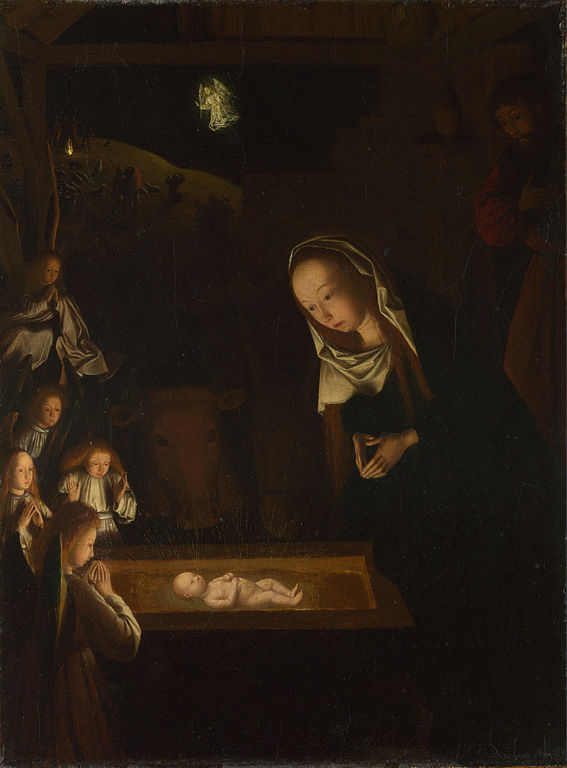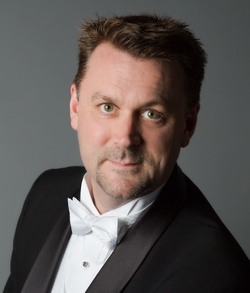Boston Cecilia celebrates the Nativity with music old and new
For the religiously minded, the Christmas season is a time to ponder a great mystery. The centerpiece of the season is the Nativity story, an event popularly recreated in liturgical plays, miniature figurines, and frescos that adorn church walls all around the globe. Music that explores the Nativity story is no less rich for its differences of interpretation and emotional poignancy.
That was certainly the case Friday night at the Church of the Advent, where Nicholas White and Barbara Bruns led Boston Cecilia in Nativity-themed music that spotlighted the subject’s intimacy and exuberance.
The highlight of the program was two works composed by White himself. His Alleluia! Puer Natus Est Nobis, written in 2002, is an eight-movement exploration of the Nativity with the beloved Sarum chant bookending its tender outer sections.
White’s compositional voice is ear-catching and thoroughly tuneful. The long melodies of his piece wander through a field of colorful harmonies. Icy dissonances hang in the air like light through a church window, and the recurring “Alleluias” sound out like vocal fanfares.
White led a reading that was remarkable for its softness of line. The singers of Boston Cecilia were capable of producing a smooth tonal blend, but the ensemble sounded weak at the bottom end. That deficiency was present in the “Videntes Stellam,” where basses and tenors couldn’t supply enough counterweight to the ensemble’s strong and more numerous altos and sopranos.
The “Alleluias” feature some of White’s trickiest writing, and the choir took time to warm up to the darting lines with requisite confidence. The singers were most comfortable in the “Quem Vidistis,” which featured the voices in blocks of slow moving harmonies.
The beating heart of the work is the “O Magnum Mysterium.” There, soprano voices swirled and flowed over supple harmonies in the lower voices. White coaxed singing of soft elegance and the lines swelled into full phrases in the movement’s climatic points.
White composed the carol The Crib and the Cross this past year in celebration of his parents’ fiftieth wedding anniversary. Friday’s performance marked its world premiere and featured Cecilia in its best singing of the evening.
The work unfolds in searching melodies that come to rest on jazz-tinged harmonies. White, here, shows his cleverness at text setting. The phrase “in the hearts of men that are crowned with thorns” culminated in a chord that pricked the ear like a needle. The passage that refers to the baby Jesus as “the great and glorious guest” swelled to angelic heights in the women’s voices. Over all, the work is a love letter to the Nativity story, and White led the singers in a svelte performance.
The other recent work heard Friday night was Dan Roihl’s To Us This Day.
The piece, spanning eight verses and a chorus, beams with lyricism. The melodies unfold over simple harmonies and in interlocking parts. Roihl also makes use of different textures, and verses shift palpably between men’s and women’s voices. It’s a tender and touching work, and Roihl led Boston Cecilia in an affecting performance.
Benjamin Britten’s A Ceremony of Carols, which opened the concert, offers a haunting mix of ancient and modern sound worlds. The work spins a web of radiant melodic lines, and chant, though Britten’s original music permeates many of its movements.
The women of Boston Cecilia, led by Barbara Bruns, sang with the purity of an English boy choir. The phrasing was tender and well attuned to the vocal line. “There is no rose” flowed in smooth, pristine arcs. Soloists Marylène Altieri and Wendy Heckman sang capably and with buoyant energy in “The Spring Carol.” Their rosy-toned melodies moved softly over the harp’s weeping harmonies in “That yongë childe” and “Balulalow.”
The singers delivered “Wolcum Yole!”with rhythmic precision. But attention to detail was missing in some of the other movements, causing the overlapping lines of “As Dew in Aprille” and “This Little Babe” to blur. That was remedied in “Deo Gracias,” which sounded with clear diction and vibrancy. The chants that open and close the piece were supple and graceful.
Harpist Erica Driscoll performed her accompaniment with a light touch to coax music that was almost more felt than heard. The Interlude, in perhaps one of the most beautiful performances this reviewer has heard, revolved in phrases that rose and fell like breathing.
Chant runs through the heart of Poulenc’s Quatre petites prières de Saint François d’Assise,which the men of Boston Cecilia performed Friday night.
In “Salut, dame Sainte” the voices came together in sheets of glowing sound. The lines of “Tout puissant, très saint” and “O mes très chers frères” unfolded over shifting chromatic chords. Chromaticism also captured the painful rapture of “Seigneur, je vous en prie.” In all instances the singers shaded the lines with sensitive dynamics.
Franz Biebl’s Ave Maria was composed in 1964. Scored for men’s voices, it flows between solo chant and rich passages scored for multiple parts. The singers performed it with warm tone and supple phrasing.
As an instrumental interlude, Bruns performed Louis Vierne’s Carillon de Westminster, a paraphrase of Big Ben’s chimes that made full use of the church’s Aeolian-Skinner organ. The piece is one long crescendo that builds to a sturdy climax. Bruns performed its cascading figures with elegance and dexterity.
Filling out the program were hymns that called for the audience to sing along. Bruns lent sturdy support on the organ as the church full of singers sang with spirited voice. With that, Boston’s Christmas concert season had begun.
The program will be repeated 3 p.m. Sunday at All Saints Parish in Brookline. bostoncecilia.org; 617-232-4540
Posted in Performances

